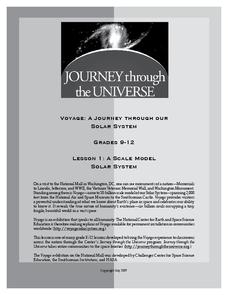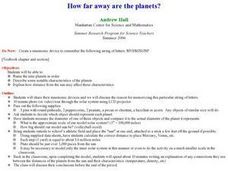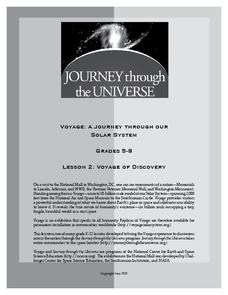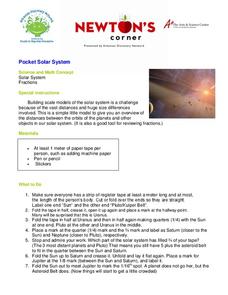University of Colorado
Looking Inside Planets
Researchers use scientific data to understand what is inside each of the planets. The first in a series of six, this instructional activity builds off of that concept by having pupils use a data table to create their own scale models of...
University of Colorado
Looking Inside Planets
All of the gas giant's atmospheres consist of hydrogen and helium, the same gases that make up all stars. The third in a series of 22, the activity challenges pupils to make scale models of the interiors of planets in order to...
Star Date
Solar System Scale Model Demonstration
Explore outer space and decorate your classroom with an astronomy project. Learners create a visual model with the creation of a scaled solar system using different sized balls.
Curated OER
Lab Activity: Model of the Planets
This worksheet leads the class through the calculations needed to construct circles to represent the planets of our Solar System. The actual values are provided, as are suggested calculations to create the scale diameters. The ten...
Space Awareness
Know Your Planets
Does your class know their planets? Implement an activity that has them describing the solar system, identifying properties of the planets, and placing them in order from their distance from the sun.
Journey Through the Universe
A Scale Model Solar System
Between the time scientists discovered Pluto and reclassified it as a dwarf planet, it did not even make one full revolution around the sun. In two activities, scholars investigate scale models and their properties. Pupils find that it...
Community Consolidated Schools District 168
Solar System Model Project
Challenge young astronomers to demonstrate their knowledge of the solar system with this fun open-ended science project. Provided with a short list of requirements, students are given the freedom to use their creativity and whatever...
Curated OER
Solar Systems Models Foldable Question Sheet
For this solar system worksheet, students use foldable models they made of the planets to answer questions about each planet. They answer questions about the theories and predictions made in our history about the solar system and answer...
Center for Math and Science Education
Pocket Solar System
How in the world can something as big as the solar system possibly fit in your pocket? Complete this simple modeling activity and find out, as young scientists gain an appreciation for the incredible scale of outer space.
Star Date
Astronomy Day from McDonald Observatory Solar System Scale Activity
Add a visual aid to your solar system lessons. Enthusiastic astronomers create a model depicting the nine planets and their distance from the sun.
Curated OER
Seeing a Dwarf Planet Clearly: Pluto
In this dwarf planet activity, students use images from the Hubble Space Telescope and they determine the scale of the image, they identify the largest features in the images, they calculate the volume of Pluto and they create a model of...
Curated OER
How Far Away Are the Planets?
Young scholars name nine planets in order, describe some notable characteristics of the planets, explain how distance from the sun may affect these characteristics, and create solar system models.
Curated OER
Solar System Hall Model
Not novel, but fun, this activity gets your space science learners to model the size of the planets and the solar system along your school's hallway. Scaled measurements as well as actual distances are provided for both planet diameters...
Journey Through the Universe
Voyage of Discovery
Did you know that Pluto is smaller than the United States of America? It is difficult to conceptualize the size of planets and the distance between them, and the lesson addresses those exact issues. After a discussion, pupils create...
Curated OER
Pocket Solar System
Motivate your class with this lesson. Learners explore the solar system and practice working with fractions using this resource. They construct scale models of our solar system, and use fractions to correctly configure the solar system...
Curated OER
Using a Graphic Organizer to Research a Question
Is Pluto still a planet? Using this popular question, kids are introduced to graphic organizers as a writing tool. As a class, they watch a demonstration on how to use them and work together with a partner to research whether Pluto is a...
Curated OER
Discovering Planet X
Students investigate the movements of the planet Pluto. Students participate in a hands-on activity to record data similar to the movements of the planet Pluto. Students compare their data to that found on a website.
Curated OER
The Webb Space Telescope: Detecting Dwarf Planets
In this detecting dwarf planets worksheet, high schoolers read about the Webb Space Telescope that will be launched in 2014 to detect dwarf planets using an infrared telescope. Students solve 3 problems and create a graph for each using...
University of Colorado
Phases of Charon
Pluto, although no longer considered a planet, has five moons. Pluto's moon, Charon, is the focus of a resource that describes how the moon is viewed from the surface of Pluto. Photos help individuals see how Charon would look at...
Journey Through the Universe
Our Solar System
Take your class on a journey through our solar system. Learners explore each planet, from Mercury to Pluto, and discuss various features that differentiate one from another. They complete activities related to the topics and discuss the...
Discovery Education
Solar System Scale
Extremely large or extremely small numbers are difficult to comprehend. To help understand the massive scale of the solar system, learners complete two activities. First, they create a model to compares the size of the bodies in the...
University of Colorado
Planetary Distances on the Playground
Earth is 149,600,000 km, or 92,957,130.4 miles, from the sun. Young astronauts create an interactive model to learn the distances between planets. Nine groups, each representing a different planet, are spread around at class-calculated...
Center for Math and Science Education
Solar System Launch
Trying to understand the vastness of outer space can be quite a challenge for young scientists. Help put things in perspective with this cross-curricular activity as students work in pairs creating scaled models of the solar system,...
American Museum of Natural History
Planetary Mysteries
Get to know our little part of the vast universe. Learners read about the common and not-so-common facts about each of the planets in the solar system. The interactive lesson includes a large amount of information as well as a quiz to...

























